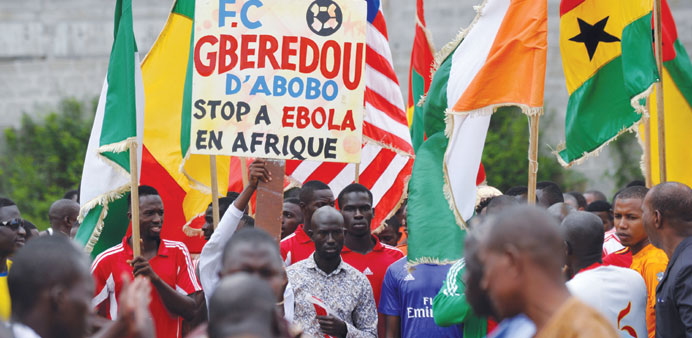Players of the ‘‘FC Gberedou Abobo’ football team pose yesterday with a sign reading ‘‘Stop Ebola in Africa’ prior to a tournament gathering youth from Guinea near the Koumassi sports centre in Abidjan.
AFP/Reuters/Freetown
West Africa was counting the cost of measures to contain the deadly Ebola epidemic yesterday, as unprecedented restrictions caused snarled transport, food shortages and soaring prices.
“We are trying to cope,” said Joseph Kelfalah, the mayor of Kenema, an eastern district of Sierra Leone that is under strict quarantine along with nearby Kailahun, but said food prices were “escalating”.
Under the country’s “Operation Octopus”, some 1,500 soldiers and police have been deployed to enforce the quarantines, turning people away at checkpoints and accompanying health workers searching for people who may have contracted the virus.
“Only essential officials and food items are being allowed in after intensive searches,” deputy police chief Karrow Kamara told AFP.
Tribal authorities are imposing huge fines for failure to report cases of Ebola, which has claimed nearly 1,000 lives in west Africa.
Sierra Leone, Liberia and Guinea are the countries hardest hit by the epidemic, which the UN World Health Organisation (WHO) has called an international health emergency.
Liberia has been particularly affected by food shortages since declaring its state of emergency on Wednesday.
It, too, has deployed soldiers to restrict movement, notably from the worst-affected northern provinces to the capital Monrovia.
Sando Johnson, a senator in the province of Bomi, northwest of Monrovia, said that the restrictions were “severe” and warned people would die of starvation if they are not relaxed.
“My county has been completely quarantined because soldiers don’t allow anyone to get out of the area and they don’t allow anyone to go there,” he told AFP by telephone. “A bag of rice that sold for 1,300 LD ($14, €11) is now selling for 1,800 LD. The poor people will die of hunger for God’s sake.”
Health workers have been tasked with raising awareness about the disease which causes fever and, in the worst cases, unstoppable bleeding.
An emergency helpline set up by Liberia’s Ebola taskforce to provide information on the virus had received 1,800 calls by Friday.
“Aside from lots of confusion, aside from sick persons, aside from the fact that we also want to create awareness, this call centre is there to create calm but to also disseminate information and to gather information that can be shared with the national task force,” said Barkue Tubman, a spokesman for the centre in Monrovia.
The virus is spread by close contact with an infected person through bodily fluids such as sweat, blood and tissue.
In Sierra Leone 10 motorcycle taxi drivers have been infected after unknowingly carrying Ebola patients, according to the president of the National Bike Riders Association, David Sesay.
The two-wheeled taxis are an indispensable form of transport in remote areas of west Africa where most roads are unpaved.
Efforts to halt the epidemic have been stymied by ignorance, distrust of Westerners and false rumours.
Nigerian President Goodluck Jonathan has warned against spreading false information “which can lead to mass hysteria, panic and misdirection”.
A Romanian man was admitted to a Bucharest hospital specialising in infectious diseases on suspicion of having contracted Ebola in Nigeria.
The 51-year-old patient who returned from Nigeria on July 25 exhibited symptoms of the virus but they could also indicate malaria or typhoid fever, a hospital source said yesterday.
Reuters later reported that health authorities said the patient did not have Ebola.
“We’ve taken all epidemiological data, step by step, and we found those elements that rule out Ebola infection in this patient in a 99% proportion,” Adrian Streinu-Cercel, director of the Matei Bals Infectious Diseases Institute, told reporters.
Nigeria has reported 13 confirmed, probable or suspected cases of Ebola, whose incubation period ranges from two to 21 days.
Meanwhile the Spanish government said that a Spanish priest infected with Ebola will be treated with an experimental drug that has been used on two Americans.
The drug called ZMapp arrived at Madrid’s La Paz-Carlos III hospital where the 75-year-old missionary was being treated in isolation, the health ministry said in a statement on Saturday.
The Roman Catholic priest, Miguel Pajares, was one of three people who tested positive for Ebola at the Saint Joseph Hospital in Monrovia where he worked.
The WHO said Saturday that clinical trials of vaccines against Ebola should begin soon and will likely be ready for widespread use by early next year.
Spain’s drug safety agency allowed the “exceptional importation” of ZMapp under a law that allows “the use of non-authorised medications in cases where a patient’s life is in danger and they can’t be treated satisfactorily with an authorised medication”, it said.
There is no proven treatment or cure for Ebola, which causes severe fever and, in the worst cases, unstoppable bleeding.
Some 55% of cases in this outbreak have been fatal.
The two Americans infected with Ebola while treating patients in Liberia have shown signs of improvement since being given Zmapp back in the United States but health authorities say it is too early to tell if the drug had anything to do with that.
ZMapp, a treatment made by private US company Mapp Pharmaceuticals, is still in an extremely early phase of development and had only been tested previously on monkeys.

